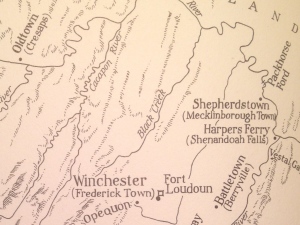I think I need to start blogging more regularly about my finds in Boston area used bookstores. Yesterday afternoon it was Atlas of American History, edited by James Truslow Adams and published by Scribners in 1943. I paid five bucks for this book, which, following a beautifully simple plan, consists of 147 full page maps. There are no paragraphs of text aside from the briefest notes where they can be fit into the maps themselves, and (a somewhat strange claim) there are no “nonexact pictorial interpretations”. It works, though, and some of the maps are incredible.
I guess I’m always thinking about maps, but this book fits particularly well with some other things I’ve seen lately. A little while ago the London Review of Books casually upended the world when they published a remark to the effect that the names of Tolkien’s hobbits were derived from American sources, in Appalachia to be specific. The Boston Public Library is putting on an exhibit of maps of imaginary worlds. They had Narnia, Middle Earth, and Westeros, but also Redwall; it was nothing revelatory, perhaps, but still cool to see them large and in one place. Look at some of the place names on the map below. What’s so fantastical, so outlandish, about fantasy?

